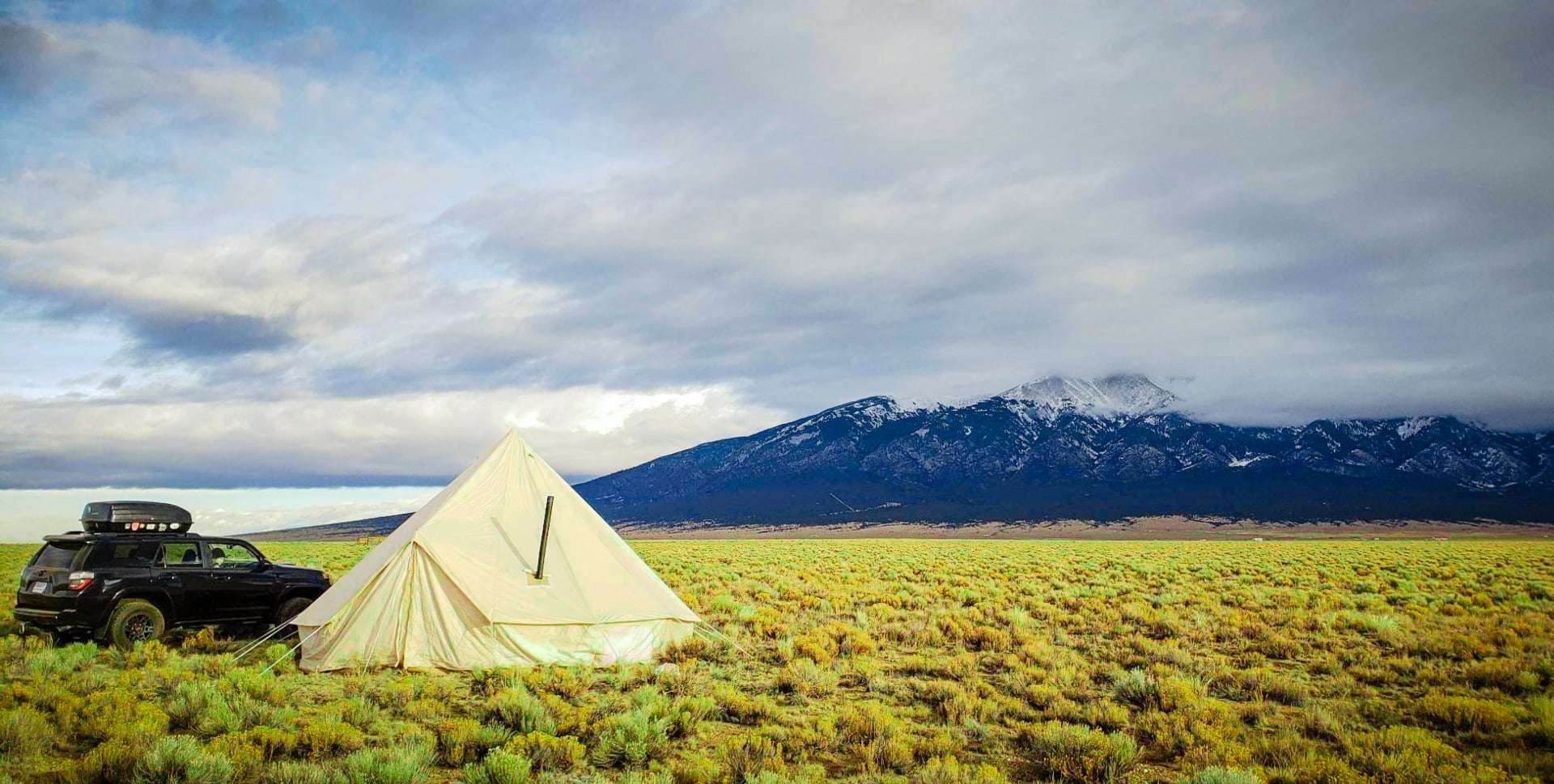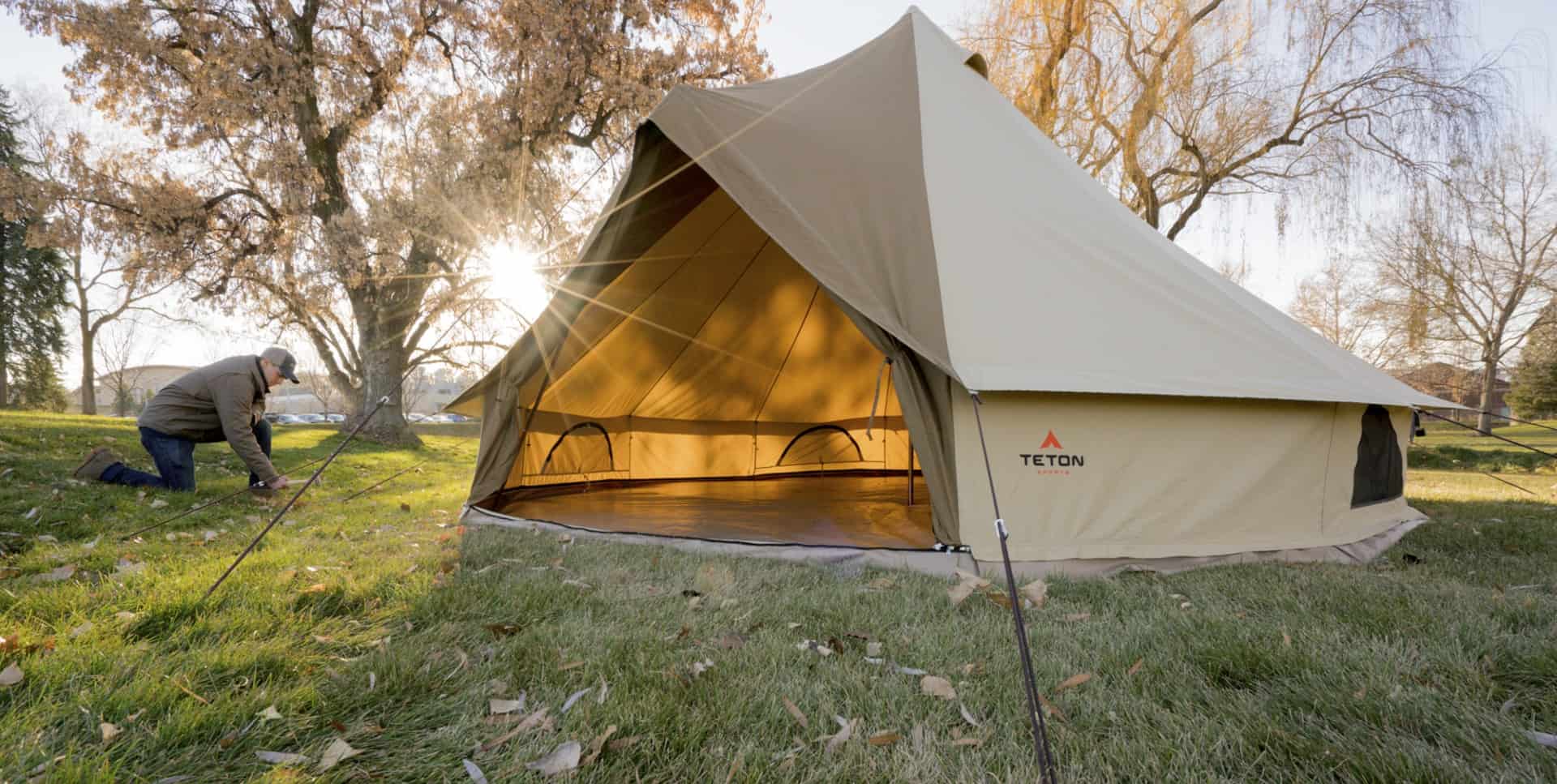Although tents made from synthetic materials (such as polyester, nylon or silpoly – a blend of the two) are generally more popular, canvas tents offer a more durable alternative for those looking for a tent that’ll stand the test of time.
In this article we’ll go through some advantages and disadvantages of canvas tents to help you decide whether purchasing one might be the right option for your camping needs.
Advantages and Disadvantages of Canvas Tents: Quick Guide
Advantages
- Canvas is more durable than synthetic materials
- Canvas is easier to repair than synthetic materials
- Canvas regulates temperature better than synthetic materials
- Breathability of canvas can help prevent condensation
- Canvas is more fire resistant than synthetic materials
- Canvas is more sustainable than synthetic materials
Disadvantages
- Canvas tents are too heavy for backpacking
- Non-freestanding nature of canvas tents makes them more difficult to set up on hard ground
- Some canvas tents don’t come with a floor
- Canvas takes much longer to dry than synthetic materials
Advantages of Canvas Tents
1. Canvas is more durable than synthetic materials
While synthetic materials offer decent durability for a tent you’d take backcountry camping, canvas’s thicker and denser structure than polyester or nylon makes canvas tents much tougher and more resistant to wear and tear than synthetic models. A well-maintained canvas tent can perform well for decades.
For more info, check out our articles on how to clean a canvas tent and how to waterproof a canvas tent to help ensure your humble abode will keep you warm and dry in years to come.
2. Canvas is easier to repair
Repeated use and exposure to the elements are bound to take a toll on any piece of outdoor equipment.
If your canvas tent happens to get ripped whilst camping (which, thanks to its more durable nature, is less likely than if your tent was made of synthetic materials), it’ll be easier to repair than a synthetic tent. Repairs to canvas tents can be done pretty simply in the field using another piece of canvas and some waterproof sealant.
Canvas tents can also handle more repair jobs over time, further increasing their longevity.
3. Canvas regulates temperature better than synthetic materials
Thanks to their thicker material, canvas tents are more effective than synthetic tents at temperature regulation (i.e. blocking the heat from the sun as well as preventing warmth from escaping the tent.)
This results in a temperature inside the tent that’s cooler in the summer and warmer in the winter.
Even if you leave your tent for long enough that the sun does start to heat up the inside, it’ll take longer for that to happen in a canvas tent than in a synthetic one.
4. Breathability of canvas can help prevent condensation
Cotton canvas materials are more breathable than synthetic ones – meaning that even if ventilation levels inside your canvas tent aren’t ideal, condensation levels will likely be less than if the tent was made from synthetic materials.
This isn’t to say, however, that condensation won’t occur in a canvas tent. To avoid condensation, try to camp away from static bodies of water, try to camp on dry ground, and maintain good ventilation inside your tent.
5. Canvas is more fire resistant than synthetic materials
Neither synthetic materials nor canvas are fireproof. But when exposed to high temperatures, however, canvas is a more fire resistant material than polyester, nylon or other synthetic materials.
Thanks to its more robust nature, canvas can withstand heat without sustaining damage. Nylon or polyester, on the other hand,will shrink or warp quickly in response to heat.
Impressively, some canvas tents come fitted with stove jacks that accommodate chimneys to let you use a wood stove. Say hello to warm and tasty meals!
If you’re planning on using a heater inside your tent, make sure to read our article on how to use a tent heater safely.
6. Canvas is more sustainable than synthetic materials
Cotton canvas is a natural, organic fabric that will biodegrade over time (don’t worry, you’ll be able to see your tent through its useful lifespan first).
In contrast, synthetic materials like polyester or nylon are inorganic and non-biodegradable; and these can take hundreds of years to decompose. Leave no trace? I think not.
Potential Disadvantages of Canvas Tents
1. Canvas tents are too heavy for backpacking
This is arguably the biggest drawback of canvas tents. Sure, they’re more durable, they’ll last for many years, and they look downright fantastic – but you’re not going to want to carry a canvas tent into the backcountry. They weight a lot.
Instead, bring your canvas tent car camping. Post up for a few days (on some soft-ish ground that your stakes can go into) under a pine tree and grab your book. Enjoy not having to carry it any further than from your car to “just over there”.

2. Non-freestanding nature of canvas tents makes them more difficult to set up on hard ground
As canvas tents aren’t freestanding (and thanks to the weight of canvas itself), you’ll likely need to use more than a dozen stakes to get the tent to stand completely (in conjunction with the necessary poles). This can make camping on hard ground difficult.
3. Some canvas tents don’t come with a floor
This can happen with polyester or nylon tents too, but it’s more common with canvas tents.
There’s nothing technically wrong with this, but make sure to check in advance before you buy.
4. Canvas takes much longer to dry than synthetic materials
Canvas materials are thick and bulky – meaning canvas tents take a lot longer to dry than synthetic ones.
If the tent material is wet and you have to pack it away, make sure to give the tent a proper airing when you get home. Mildew stains can not only be a pain to get off (and affect the visual appeal of your tent even when scrubbed off), but you’re risking mold and rotting that can permanently damage the tent material.
If you’re having problems with this very issue, read our article on how to clean a canvas tent.
Final Thoughts
If you’re looking for a durable tent to keep in one camping spot, a canvas tent might be the right option for you. If you want to head out backpacking, take something on the synthetic side. Your back will thank you for it.
